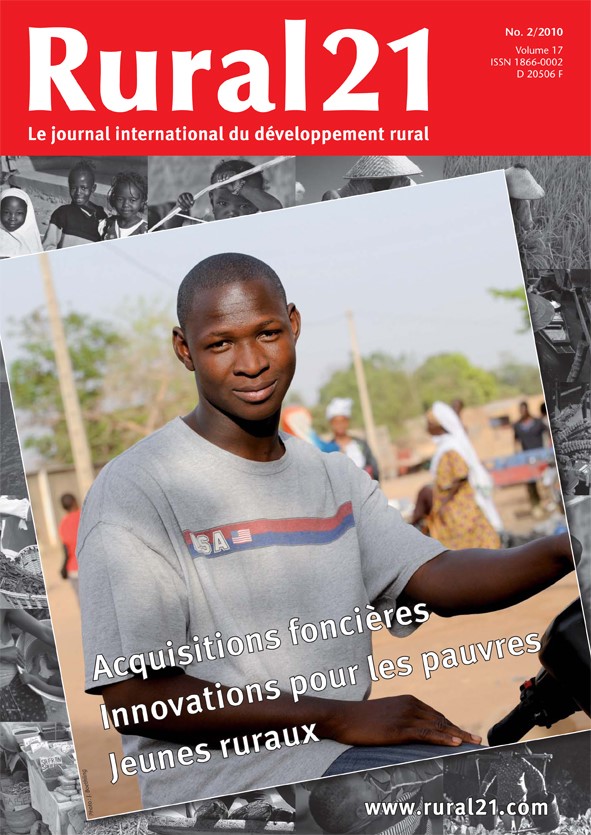Location
The international journal Rural 21 has dedicated more than 40 years to all topics surrounding rural development. Its ambition is to further those strategies and policies that strengthen rural areas of developing and newly industrialising countries and encourage their implementation. The journal addresses the complete range of relevant themes – from agriculture and fisheries via capacity building and education through to health and social security, energy supply and trade. Center-stage is always devoted to inquiring into how measures and strategies can contribute to global food security and to reducing poverty.
Rural 21 desires to further the dialogue between science and politics, the private sector, civil society and practitioners. Two platforms are designed for this purpose: Rural 21 in print is published four times a year, each issue highlighting a specific focus of rural development – this print edition is read in more than 150 countries. In parallel, Rural 21 online keeps the rural development community up to date on news and events, scientific findings and other print and online publications.
Rural 21 is published by DLG-Verlag GmbH in Frankfurt/Germany. Financial partners are BMZ (German Federal Ministry for Economic Cooperation and Development), GIZ (Deutsche Gesellschaft für Internationale Zusammenarbeit), DLG (German Agricultural Society – Deutsche Landwirtschaft-Gesellschaft), SDC (Swiss Agency for Development and Cooperation) and Helvetas Swiss Intercooperation.
The first issue of Rural 21 dates back to 1968. From 1974 to 2007, the journal was published in three languages entitled "entwicklung & ländlicher raum" / "agriculture & rural development" / "agriculture & développement rural". In 2008, the journal was relaunched as "Rural 21".
Members:
Resources
Displaying 206 - 210 of 319Adapting African agriculture to climate change
Climate change is one of the major threats to the development of rural Africa, and without wide-ranging adaptation strategies the challenge it presents cannot be met. Although appropriate measures have been identi? ed, international funding for adaptation has not materialised at the rate that was pledged. This is irresponsibly delaying the implementation of adaptation measures.
International migration flows: key data and trends
Migration is a huge phenomenon. The share of migrants in industrial countries’ populations doubled over the past three decades, and remittances ? ows to developing countries are larger than foreign investment or overseas aid. In many developing countries the percentage of the population working abroad and the percentage of Global Domestic Product (GDP) represented by remittances run into double digits.
Female migration: cultural and social change in Bangladesh
The debate about the e? ects of migration is still centred on economic aspects. However, the return of migrants also changes the society and cultures of their country of origin. These changes are particularly pronounced where women have emigrated and return to their communities after several years’ absence.
Rural migrant workers in China
In today’s China, about 220 million rural migrant workers are on the move – this is more than two thirds of the US population – and their number is set to increase in the course of the country’s urbanisation process. At a rate of 47 percent, still below global average, and against the backdrop of a marked rural-urban divide, urbanisation is not only an effect of rapid economic development, but also forms part of the Chinese government’s economic development strategy.
Services environnementaux et changement climatique
La république du Ghana, l'une des démocraties africaines les plus stables, fait face à une surexploitation continue de ses ressources naturelles résultant en d'énormes pertes financières et de graves implications pour les populations pauvres. Le projet « Forêts tropicales et adaptation au changement climatique », financé par l'Union européenne, tente d'identifier des instruments appropriés pour le financement de mesures d'adaptation au changement climatique. L'un de ces outils de financement pourrait être le paiement pour services environnementaux ou PSE.



